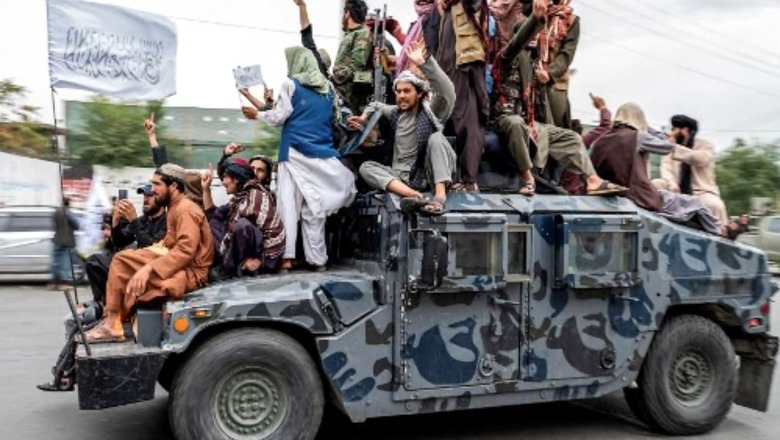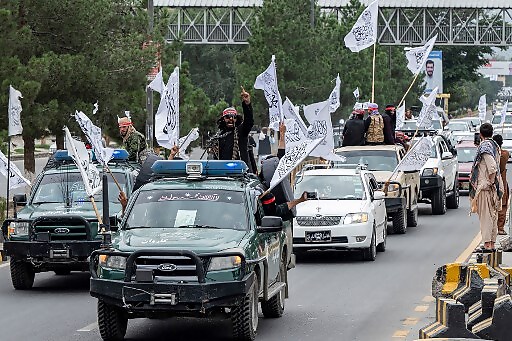
views
The Taliban government in Afghanistan marked their first anniversary of return to power in Afghanistan with a national holiday on Monday, following a turbulent year that saw women’s rights crushed and a humanitarian crisis worsen.
A year ago on August 15, the hardline Islamists had captured Kabul after an offensive against the government forces ended two decades of US-led military intervention. The Taliban offensive had led a migration spree, where tens of thousands of people stormed the Kabul airport, climbing atop aircraft and some clinging to a departing US military cargo plane as it rolled down the runway — aired on news bulletins around the world.
Rare Protest on Anniversary
Ahead of the first anniversary of Taliban government, a rare protest organised by women were violently dispersed by Taliban fighters. About 40 women — chanting “bread, work and freedom” — marched in front of the education ministry building in Kabul, before the fighters dispersed them by firing their guns into the air.
The demonstrators carried a banner which read “August 15 is a black day” as they demanded rights to work and political participation. “Justice, justice. We’re fed up with ignorance,” they chanted, many not wearing face veils.
‘Life has lost its meaning’
For ordinary Afghans, especially women, the return of the Taliban has increased hardships. Initially, the Taliban promised a softer version of the harsh Islamist rule, but many restrictions have been imposed on women to comply with the movement’s austere vision of Islam.
Tens of thousands of girls have been shut out of secondary schools, while women have been barred from returning to many government jobs. And in May, they were ordered to fully cover up in public, ideally with an all-encompassing burqa.

“From the day they have come, life has lost its meaning,” Ogai Amail, a resident of Kabul, told AFP. “Everything has been snatched from us, they have entered even our personal space,” she said.
Humanitarian crisis
While Afghans acknowledge a decline in violence since the Taliban seized power, the humanitarian crisis has left many helpless.
“People coming to our shops are complaining so much of high prices that we shopkeepers have started hating ourselves,” said Noor Mohammad, a shopkeeper from Kandahar, the de facto power centre of the Taliban.
For Taliban fighters, however, the joy of victory overshadows the current economic crisis.
“We might be poor, we might be facing hardships, but the white flag of Islam will now fly high forever in Afghanistan”, said a fighter guarding a public park in Kabul.
Kabul Airport
Tens of thousands of Afghan men, women and children rushed to Kabul’s airport a year ago in a desperate bid to flee the advancing Taliban, who seized power on August 15, 2021.
One year on, the airport is now back to some kind of normalcy, with a few domestic and international flights operating. But significant support is needed for major foreign airlines to resume a full schedule from the facility.

Taliban authorities have tasked an Abu Dhabi-based firm with ground handling services and security screening of passengers. Air traffic control is the responsibility of Afghans trained by experts from Uzbekistan and Qatar. Kabul airport’s return to full operations is seen as crucial to reviving Afghanistan’s shattered economy.
‘Little achievement’
After a year of Taliban takeover, some Afghans have welcomed improved security. However, the poverty, drought, malnutrition and fading hope among women have overshadowed the regime’s little successes. The civilian deaths, which used to be in thousands every year, has reached a record low since August last year.
The regime also announced a ban on the growing of poppies, used to make heroin. Afghanistan had been the world’s largest source of opium for many years.
There’s no firm evidence on how the clampdown has been progressing, but reports from poppy-growing areas in Helmand province in the south suggest the Taliban have been forcing farmers to destroy poppy fields, a report in BBC said.
Presence of al-Zawahiri
As Taliban was about to complete a year, the presence of Al-Qaeda chief Ayman al-Zawahiri in Afghanistan has led to a setback for the Taliban regime. It claimed having had no knowledge about the presence of al-Zawahiri, after the US announced August 2 it had killed him in Kabul with a drone strike. However, the Al-Qaeda leader’s assassination proves how vulnerable Taliban leaders could be to a high-tech enemy.
Read the Latest News and Breaking News here




















Comments
0 comment